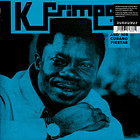With his first two albums, recorded in 1976 and 1977, Alhaji K. Frimpong became a musical icon in his native Ghana — and soon across West Africa. In the so-called developed world, listeners barely noticed more than »Kyenkyen Bi Adi M’awu«, casually filing Frimpong away as a one-hit wonder. His Afro-fusion music met widespread indifference at the time — a state of affairs that has since shifted dramatically. Today, his early works are regarded among the finest highlife albums ever recorded and as key foundations of the Afro-funk movement. No surprise: together with his band Vis-A-Vis, Frimpong fused traditional Ghanaian melodies and rhythms with Western arrangements, Cuban drum patterns, jazzy horn sections and funk-driven guitar licks — energetic, infectious, precise. Artists such as Gnarls Barkley and Chronixx now sample or cover his songs, while original pressings and reissues remain rare and costly.
This pattern of reception is all too familiar — a reflection of the Western gaze on so-called non-Western popular music: celebrated locally yet ignored or patronised abroad until rediscovered decades later, often with belated recognition of its artistic depth. The album K. Frimpong & His Cubano Fiestas stands as a vivid testament to the creative richness and cultural weight of Ghanaian highlife — and as an invitation to reconsider one’s perspective and engage with the living present of African music.


